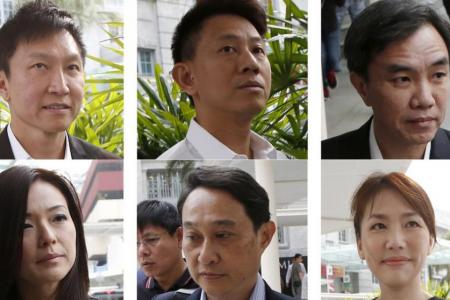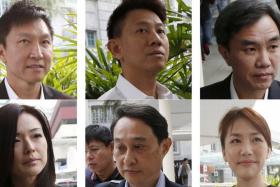CHC case: AGC seeks ruling on meaning of 'agent'
City Harvest Church leaders' case heads to Court of Appeal
The Attorney-General's Chambers (AGC) will take the high-profile City Harvest Church (CHC) leaders' case to the Court of Appeal on legal questions of public interest.
In what is called a criminal reference, the prosecution aims to raise questions on the interpretation of the criminal breach of trust (CBT) charge under section 409 of the Penal Code.
The AGC said yesterday that it believes that questions of law of public interest have arisen out of the High Court's decision, particularly on the meaning of "agent" under section 409.
This follows the High Court's split decision on Friday, in which CHC founder Kong Hee, 52, and five other leaders had their original jail terms slashed.
The six were originally convicted of engaging in a conspiracy to commit CBT by an agent under section 409.
They had misappropriated millions of church funds to fuel the music career of Kong's wife, Ms Ho Yeow Sun, in a church mission.
The court found that they had invested $24 million from CHC's building fund in bogus bonds from music production firm Xtron and glass-maker Firna, and the money was used to fund the church mission.
Later, another $26 million was used to cover up the initial misdeed.
Two of the three judges, Judge of Appeal Chao Hick Tin and Justice Woo Bih Li, found that the six did not fall within the meaning of "agent" under section 409 and should have been convicted of a lesser CBT charge under section 406.
Justice Chan Seng Onn disagreed that section 409 applies only to professional agents.
As section 406 provides for up to seven years' jail - compared with up to 20 years' jail and a fine under section 409 - Kong's initial eight-year term was reduced to 3½ years.
The other five, who had jail terms ranging from 21 months to six years, were given new sentences ranging from seven months to three years and four months.
Criminal lawyer Sunil Sudheesan told The New Paper yesterday that the High Court has interpreted the CBT charge "quite differently".
It deviated from a long-held legal position set by a 1970s High Court case that directors who misappropriate a company's property they are entrusted with are liable for the more serious CBT offence as agents.
The shift led Law Minister K. Shanmugam to point out the "serious implications in other cases, including corruption cases and our zero-tolerance approach for the future".
He said on Saturday: "We will have to consider as a matter of policy what other steps to take because we cannot relax our stand on that."
Lawyers told TNP that criminal references are rare. Usually filed under exceptional circumstances, it will be heard either by an appointed three- or five-judge panel, depending on the significance or complexity of the case, Mr Sudheesan said.
The AGC said if the Court of Appeal agrees with its submissions, the prosecution intends to ask the apex court to reinstate the original convictions under section 409 and "make necessary and consequential orders in relation to the sentences given".
FOR MORE, READ THE STRAITS TIMES TODAY
Get The New Paper on your phone with the free TNP app. Download from the Apple App Store or Google Play Store now



